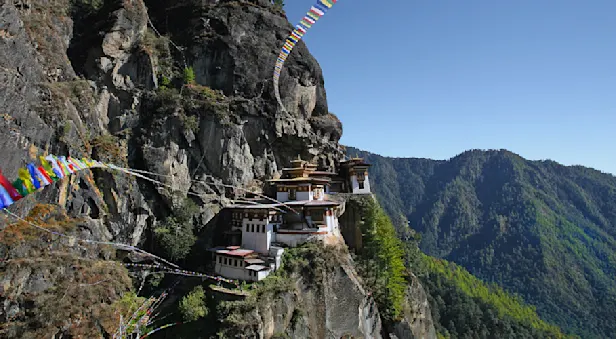Know Before You Go
Bhutan's Cultural Do's and Don'ts
Although Bhutan welcomes foreigners, the country is extremely conscious regarding its culture and is deeply religious. This Himalayan kingdom is the only Vajrayana Buddhist country on earth, and the influence of these traditional beliefs pervades every aspect of daily life.
Here are some guidelines to follow during your stay in Bhutan:
The king and former king are accorded a great deal of respect in Bhutan. It is wise to bear this in mind when conversing with local people. Avoid politically sensitive issues.
Use your right hand when giving or accepting any object—never your left hand. To use both hands is even more respectful.
Don’t point at sacred items or paintings. Instead, motion with your chin or extend your hand, palm flat and skyward, at the object you’re referencing.
A prayer wheel contains a scroll of mantras at its core, called a “Life Tree.” The wheel is always spun clockwise, the same direction as the prayers are written and in line with how the sun moves across the sky. The effect of spinning the wheel is the same as chanting a mantra orally and is thought to spread blessings, wisdom and good karma. The purifying process of upaya is a way to help a practitioner along their path to realizing enlightenment.
While walking, always pass manis (carved stones), chortens/stupas (Buddhist monuments) and prayer flagpoles with your right side facing the sacred object.
It is demeaning and disrespectful to sit on mani stones, as they are inscribed with the mantra of Avalokitesvara, a being of enlightenment who embodies the compassion of Buddha. The same applies for stupas, as these sacred structures contain relics and are places of meditation and worship for Buddhists.
When visiting temples, remove footwear and hats. Dress conservatively in a way that expresses respect for the place of worship.
For the most part, you can take pictures inside temples, although there are a few exceptions; ask your guide for information.
In general, the Bhutanese do not mind being photographed. Just make sure you ask first, taking photos only after receiving permission.
To sit with your feet pointed toward anyone who is older than you or at a Buddhist statue is extremely disrespectful.
It is customary to make a small donation at a monastery or temple as a token of respect. If you wish, leave an offering of a few bills in front of a Buddhist statue or on the altar for the monks.
Smoking is illegal in public areas. Refrain from taking tobacco products to sacred sites.
Climbing some of the Himalayan peaks is forbidden, as these sacred mountains are regarded by local communities as the dwelling places of spirits and deities.
Swimming, or even throwing stones into rivers, is forbidden—it is thought to disturb the souls of deities.
Do not litter anywhere. Pack any trash in a small plastic bag and dispose of it at your hotel. The Bhutanese treat their natural environment as a divine gift.
Taking antiques (religious items more than 70 years old or any other item more than 100 years old) out of Bhutan is prohibited by law unless you obtain a permit from the Department of Antiquities. Instead, look for artifacts that have an official seal from the government certifying that they can be exported. If you have bought a thangka (Buddhist painting) or other cultural artifact or sacred relic, make sure you have receipts and permits ready to present to a customs officer on departure.
As in Nepal, giving out candy and other sweets is particularly damaging because these contribute to dental problems, especially in remote villages. Handing out money or gifts also creates unrealistic expectations. More positive, suggested ways to communicate with children include blowing bubbles, drawing funny pictures, tossing a Frisbee or ball, or taking photos on a digital camera and showing them their images.
Travel to See South Asia's Animals

Wild & Ancient Himalaya: Nepal & Bhutan
Explore mountain heights and jungle lowlands on this soulful journey through the cultural and wildlife treasures of two neighboring Himalayan nations—including rhino tracking in Chitwan National Park.
























